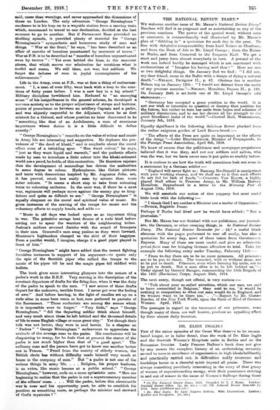THE NATIONAL REVIE15' DIARY.* WE Welcome another issue of Mr.
Maxee's National Review Diary.' Readers will find it as poignant and as entertaining as any of the previous numbers. The power of the quoted word, without note or comment., is extraordinarily well illustrated by Mr. Ma.xse*s plan of "dibbling in" a quotation for each day in the year. He flies with delightful irresponsibility from Lord Nelson to Chatham, and from the Book of Job to Mr. Lloyd George ; from the Kaiser to Burke, and from Cromwell to the Emperor Karl. We get a start and jump from almost everybody in turn. A perusal of the work can indeed hardly be managed which is not annotated with exclamations of "Imagine his having said that ! " Hero are one or two delightful things. On January 2nd we find : "I did not, my dear friend, come to the Baltic with it design of dying a natural death."—NamsoN, Pettigrew II., p. 62. Glorious too is another Nelson tag on January 12th: "1 would not detract from the merit of my greatest enemies."—Narems, Hamilton Papers II., p. 128.
On January 24th is set forth one of Mr. Lloyd George's odd statements:—
" Germany has occupied a great position in the world. It is not our wish or intention to question or destroy that position for the future, but rather to turn her aside from hopes and schemes of military domination and to see her devote all her strength to t ho great beneficent tasks of the world."—Central Hull, Westminster, January 5th, 1918.
Equally significant is the following delicious flower plucked from the rather exiguous garden of Lord Beaverbrook :— " The efforts of the Press are quite as important as the efforts of the Arm,y."—LORD BEAVEBBROOK, Minister of Propaganda, to the Foreign Press Association, April 9th, 1918.
We knew of course that the politicians and newspaper-proprietors believed that it was they, and not our soldiers and sailors, who won the war, but we have never seen it put quite so crudely before.
It is curious to see how the truth will sometimes leak out even in a statement by a German soldier
England will never fight us : Ramsay MacDonald is omnipotent with your working classes, and we shall see to it that such efforts do not fail for lack of funds."—Cenoemr, Vox KLerz, a highly placed Staff officer in Prussian Army, to Mr. William Harvey Hamilton. Reproduced in a letter to the Morning Post of August 11th, 1916.
We will conclude our notice of this peppery but most useful little book with the following :— "I thank God I am neither a Minister nore leader of Opposition." —Bunxis, Regicide Peace.
Perhaps if Burke had lived now he would have added : "Nor a journalist."
But Mr. Maxse has not .finished with our politicians, our journal- ists, the Germans, or other creeping things, in he National Review Diary. The National Review Reminder for .19, a useful block almanac with the pages perforated to tear off easily, has also a
quotation for every day, most of them taken from Government Reports. Many of these are most useful, and give an admirable
prinuf-facie case for bringing Gorman offenders to trial. Take for example the following entry under Tuesday, February 11th :— " From to-day there are to be no more prisoners. All prisoners are to be put to death. The wounded, with or without arna.s, are to be put to death. Prisoners, even when forming big units, are to be put to death. Not a man alive is to be left behind us."— Order signed by General Stenger, commanding the 58th Brigade of the 14th (Bavarian) Corps, August 26th, 1914.
The next entry, though mot official, is very curious :—
" Talk about your so-called atrocities, which our men are said to have committed in Belgium,' they said to me, ` it would be nothing in comparison to what our men would do in England, and we women want to be there too.' . ."—Report by Mr. Gustav Roeder, of the New York World, upon the State of Mind of German Women. April, 1915.
The passages in regard to the treatment of our prisoners, even though many of them are well known, produce an appalling effect by their almost daily iteration.


























 Previous page
Previous page